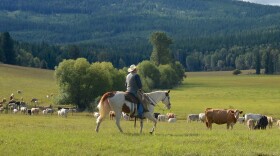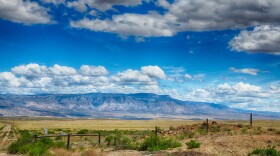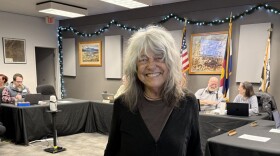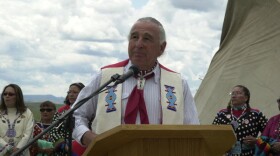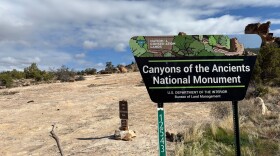
Writers on the Range
Tuesdays at 10:00 am
Writers on the Range is a Western opinion service, providing content to newspapers across the West. An independent nonprofit, Writers on the Range is dedicated to spurring lively conversation about the West. Each week on KVNF a new short feature, read either by the author or by Editor Betsy Marston.
To find out more, or to sign up for the Writers on the Range newsletter, visit writersontherange.org If you’ve thought about it, we’ve probably written about it.
Latest Episodes
-
Not waiting for an invitation from biologists who would trap, transport and then release them, Canadian wolves in 2008 trotted across the border into the state of Washington — all because they liked the territory.Writer Mitch Friedman tells the story of how that spontaneous recolonization has been a firm success, thanks to the state and an environmental nonprofit paying for deterrence. The most successful tactic has been paying range riders to block wolves from a rancher’s cattle.But Friedman says the story isn’t over: Facing a tight budget, Washington halved its wolf funding in 2025, and there are now fewer riders and angrier ranchers.
-
State representatives from Wyoming and Montana are pushing to enshrine corner crossing into law and effectively open up millions of acres of public land across the country. With courts offering only partial clarity and some state leaders insisting corner crossing is still illegal, the writers, Karlee Provenza and Joshua Seckinger, are calling for state legislation to explicitly protect public access.They warn that without such action, the West will become divided into exclusive landscapes for the rich and diminished opportunities for everyone else, undermining longstanding traditions of hunting, fishing, and outdoor recreation for working families.
-
Slim Woodruff has an ax to grind when it comes to bottled water that has been treated with a myriad of flavors, mined from halfway across the world, or that boasts of being “pure” and “natural.”"A character in the book True Grit proclaimed that he once drank water from a muddy hoof print and was glad to get it. While I might not go that far,” Woodruff writes, "I have drunk from a lot of questionable sources, and I’m still here to tell the tale. You might want to try the tap.”
-
Grand County, in southeast Utah, experienced a uranium boom during the Cold War, leaving behind many health crises. Since then, the county’s Moab area has become an international destination for outdoor enthusiasts. Now, that economy is threatened because the federal Energy Department has targeted Grand County as the perfect place to store highly reactive nuclear waste, writes Zak Podmore, who lives in the area.What’s alarming is that the Biden administration awarded $2 million to two, pro-nuclear groups in California, including Mothers for Nuclear, to help persuade Utah locals that nuclear waste is not only safe but also the basis for something it calls “nuclear tourism.”
-
Local reporter Marty Durbin in western Colorado has seen the three town councils she regularly covers change drastically. They have morphed from the sleepy meetings they were decades ago to long sessions that wade into everything from getting grants for water projects costing millions of dollars to controversial planning attempts. "I’ve watched council members exercise self-control and perseverance even as comment periods grow heated,” she reports. So the least she can do, Durlin writes, “is cover it."
-
Betsy Marston looks back at what Writers on the Range writers cared about last year, and at first, they seemed gobsmacked at Elon Musk’s indiscriminate cost cutting. Wholesale firing ripped through public land agencies like the National Park Service and Forest Service, leaving them short-staffed and struggling. Other attacks on public land management followed, the worst being the effort to sell off vast areas of public land. It was, to put it mildly, a tumultuous year, though writers found plenty of other issues to expose.
-
An obituary of Colorado Senator Ben Nighthorse Campbell, who died last weekend at age 92. Campbell was an advocate for Tribe rights and public land, first as a Democrat and then a Republican. The switch in parties in 1995 shocked his staff and surprised the public. Dave Marston describes Campbell as a supporter of unions, women’s rights, wilderness and national parks and monuments. He also loved to talk to people in small towns, and most of all, he was willing to work hard to get the bills he cared about passed. Some might find that he was the kind of elected representative we yearn for today.
-
Steve Pearce, President Donald Trump’s nominee to run the Bureau of Land Management, is a litmus test for Western senators who say they care about keeping public lands public, writes Aaron Weiss of the Center for Western Priorities.A former New Mexico congressman, Pearce spent 14 years undermining public lands, Weiss says, seeking to gut wildlife protections and sell off huge amounts of public land. Pearce has described public land as so vast that most of it "we do not even need.” Weiss warns that if confirmed, Pearce's role running the BLM would amount to liquidation.
-
Ecologist Pepper Trail takes a walk in the Oregon woods where he notices everything around him, from woodpeckers and hawks in the trees to decaying leaves and seeds scattered on the forest floor. He calls all of this "one oversimplified cycle of gift exchange. The world we inhabit is a web of reciprocity far beyond our ability to comprehend, much less control. To be alive at all seems a miracle.”He suggests, we imagine the world that we share with every living thing—and give thanks.
-
Kira Cordova was a student at Western Colorado University in Gunnison, Colorado, when her professor told the class that if they wanted to graduate and then work in the outdoors as a seasonal: “Get out of my classroom.” Seasonal work didn’t require a degree, he said, a degree is what you need after you’ve burned out in 5 to 7 years.Cordova took his advice, but burned out in only 3 years. She tells how she learned to adapt fast and flourish, but also offers advice on how to cope with everything from jobs falling through to finding yourself homeless between jobs: great advice from a seasonal pro.


